
Brazilian esports organisation FURIA has discontinued its sponsorship deal with cryptocurrency exchange FTX, FURIA’s Co-Founder André Akkari has announced on Twitter.
The decision was made after FTX, which also sponsors US organisation TSM and the League of Legends Championship Series (LCS), filed for bankruptcy.
FURIA’s one-year deal with FTX, signed in April 2022, was valued at approximately $3.2m (~£2.7m). It has not been disclosed how much of that amount FTX has already paid out. At the time, FURIA told Esports Insider it wanted to establish a ‘long term relationship’ with the sponsor.
In a post on Twitter announcing the cancellation, Akkari said: “FURIA closely follows the activities of all its partners, always attentive to the possibility of being able to contribute with them, but prioritising our fans. … The current case of our crypto exchange sponsor, which is in the global news, serves as an example.
“After a conversation with our contacts at the company, it was decided that FURIA will discontinue the FTX exhibition, removing the brand from all its spaces. The objective is to prevent the current phase of the company from harming any fan. FURIA continues to value our strong partners and promote them, however always prioritising our fans at any cost.”
The decision takes effect immediately. FTX branding is already absent from the jerseys of the organisation’s CS:GO roster as it entered the stage of the IEM Rio Major 2022.
FTX also has a major $210m (~£177m) 10-year naming rights deal with TSM, which made headlines when it was announced in June 2021 as the biggest ever publicly announced esports sponsorship deal. FTX additionally has a seven-year deal with the League of Legends Championship Series (LCS). TSM and the LCS have yet to announce whether their own deals will be terminated.

FTX filed for bankruptcy in Deleware, US on November 11th in a dramatic turnaround in fortunes for one of crypto’s biggest exchanges.
FTX was valued at $32bn during its last funding round in January 2022. The company’s downward spiral and eventual bankruptcy first started after an October 9th report by Coindesk revealed that a sister company of FTX, Alameda Research, held a substantial part of the broker’s crypto assets.
FTX competitor Binance subsequently decided to sell its investments in FTT, the cryptocurrency used by FTX. Binance then signed a letter of intent to buy its rival, but pulled out after one day of reviewing its finances, which set off a chain effect of FTX users selling their assets.
